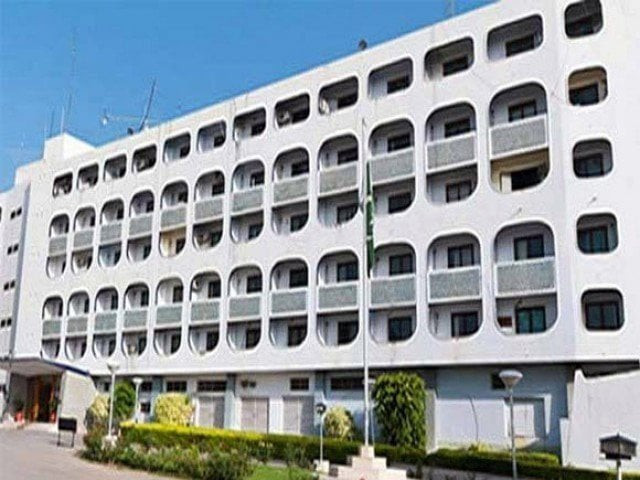India’s ‘offensive-defence’ to stock terror in region: FO
Spokesperson slams new land laws in IIOJK; denies any pressure to free captured Indian pilot last year

Pakistan on Thursday strongly condemned the belligerent and anti-Pakistan rhetoric of India’s civil and military leadership, particularly the threatening remarks by Prime Minister Narendra Modi’s National Security Adviser, Ajit Doval, earlier this week.
Foreign Office spokesperson Zahid Hafiz Chaudhri told his weekly news briefing that Indian footprint in terrorist activities in Pakistan had increased substantially since Doval’s assumption of office as India’s national security adviser.
On Monday, while speaking in the northern state of Uttarakhand, Doval had said that India would fight not only on its own territory but also on foreign soil which became the source of a security threat. He added that India would “take the battle to where the threat originates”.
Doval appeared to be toeing the line of Rashtriya Swayamsevak Sangh (RSS) chief Mohan Bharwat, whose speech on the previous day struck many as reflecting the Indian government’s plans to apply the doctrine of pre-emption to nip security threats.
At the weekly briefing on Thursday, Chaudhri also referred to BJP’s Uttar Pradesh chief Dev Singh” who said recently that “Prime Minister Modi has decided when the country would be at war with China and Pakistan”.
Chaudhri said that in recent provocative and irresponsible statements, the Indian national security adviser had implied organising attacks inside neighbouring countries.
“His “offensive-defence” doctrine can be defined simply as “stoking terrorism in the neighbouring countries”, he said, adding that Since his assumption of office of the NSA, “Indian footprints in terrorist activities in Pakistan have substantially increased”.
Meanwhile, Chaudhri said that Pakistan categorically rejected the Indian government’s illegal amendments to land ownership laws in Indian Illegally Occupied Jammu and Kashmir (IIOJK) promulgated under “J&K Re-organisation (Adaptation of Central Laws) Third Order, 2020”.
“The highly condemnable Indian action is yet another clear violation of the UN Security Council resolutions, bilateral agreements between Pakistan and India and international law.”
He said India’s illegal and unilateral actions of August 5, 2019, and subsequent measures, particularly the domicile law and now the land ownership laws, were aimed at changing the demographic structure of IIOJK to convert the Kashmiris into a minority in their own land.
The UN and the international community must take immediate action to stop India from changing the demography and distinct identity of IIOJK and facilitate resolution of the Jammu and Kashmir dispute as per the relevant UNSC resolutions and the wishes of the Kashmiri people, he demanded.
The continued crackdown against minorities, human rights organisations, media, and independent voices in India and IIOJK was also a matter of grave concern, according to the Foreign Office spokesperson.
“Pakistan expresses its deep concerns over the raids by India’s National Investigation Agency (NIA) on offices and residences of journalists and human rights activists and non-profit organisations, including Coalition of Civil Society, Association of Parents of Disappeared Persons, and Greater Kashmir newspaper in IIOJK.”
The spokesperson further said that the human rights activists, members of the civil society, NGOs, and journalists had been booked under the draconian Unlawful Activities Prohibition Act (UAPA).
“The BJP regime’s actions are another manifestation of India’s extremist agenda and its frustration over international censure for its illegal actions and grave human rights violations in IIOJK and in India.”
Captured India pilot
The spokesperson denied that there was any pressure on Pakistan to release the Indian pilot, who was captured after his fighter plane was shot down by Pakistan Air Force in February last year.
“There was no pressure on Pakistan at all regarding the release of Wing Commander Abhinandan Varthaman. The Government of Pakistan took the decision as a gesture of peace, which was appreciated by the international community,” Chaudhri said.
He was responding to a question about the claim by PML-N leader Ayaz Sadiq that Foreign Minister Shah Mehmood Qureshi had told a parliamentary leaders meeting that India would attack Pakistan if Wing Commander Abinandan was not freed.
Sadiq’s claim was already rebuffed by the chief military spokesperson at a separate briefing. The Foreign Office spokesperson said that “Pakistan has, and continues to work for peace” in the region. “However, there should be no doubt about our national resolve and preparedness of our armed forces to effectively respond to any misadventure.”





1724319076-0/Untitled-design-(5)1724319076-0-208x130.webp)













COMMENTS
Comments are moderated and generally will be posted if they are on-topic and not abusive.
For more information, please see our Comments FAQ